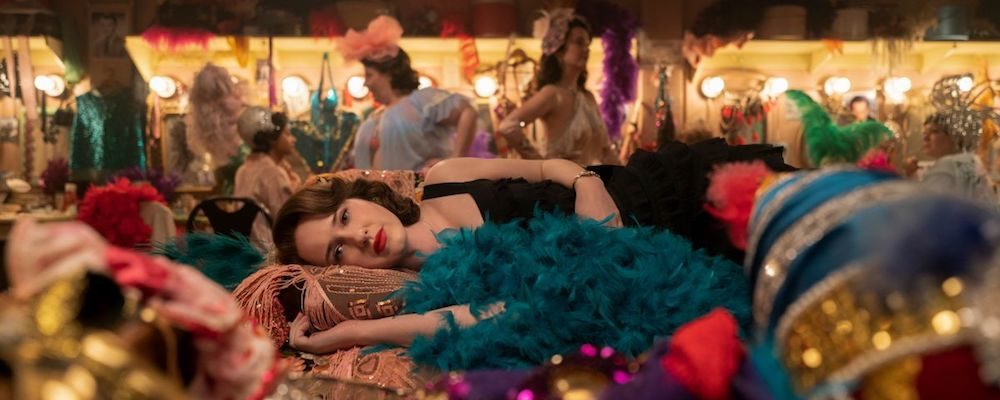‘The Marvelous Mrs. Maisel’ Gets Less Marvelous With a Fourth Season That Goes Back to Underdog Mode
Alci Rengifo
The magic and the curse of Amazon’s award-winning “The Marvelous Mrs. Maisel” is that it created one of the great recent TV underdogs. Midge Maisel (Rachel Brosnahan) was a fantastic feminist fighter trying to prove she had what it took to be a stand-up comic, while at the same time embodying that universal struggle of any aspiring artist. Even more potently, the narrative was set at the tail-end of the conservative Eisenhower ‘50s. The show could bask in being a fun period piece as well. Once Midge began to finally taste success, the tensions in the narrative struggled to become as rich as the initial seasons. Once the underdog reaches the dream, it can either continue inspiring them or break them. Now comes season four, where the showrunners apparently believed the best course of action was to simply swing Midge back to the beginning. The dream has been taken away and must be rebuilt anew.
When last we saw Midge, she blew it at The Apollo where her bold humor about the closeted gay identity of Shy Baldwin has gotten her fired. Season four opens with the shattered comic riding in the back of a car with manager Susie (Alex Borstein). It’s a double stroke of bad luck as Susie now has no choice but to face the fact that she’s squandered much of what Midge earned through gambling and other shady deals. For Midge it’s an utter catastrophe increased by her recent decision to move back into her beloved old apartment with a loan by her ex-father-in-law, Moishe (Kevin Pollack). Speaking about exes, Midge’s estranged spouse Joel (Michael Zegen), is dealing with the quirky fallouts of getting into the business of owning a club owned by Chinatown gangsters who happily use the space for meetings. At least Midge’s dad, Abe (Tony Shalhoub) finally gets a new job, this time as a theater critic for The Village Voice. With her own ambitions in tatters, Midge faces being canceled while trying to get credit lines extended.
In the Peak TV era it’s almost a given that once your show enters the fourth season zone, the real test of fire has arrived over how much longer the narrative can stay engaging. With every show rushing now to be seen as something equal or superior to a movie, lots of excellent concepts get greenlit that would have been great as a feature or have oxygen for two, maybe three seasons of television. “The Marvelous Mrs. Maisel,” which like many shows was forced to push back production of this season because of the pandemic. We haven’t seen any updates on its world since 2019. Even with extra time for tweaks, the series is now starting to feel aimless. The high production values are still here with the rich period details, which are so well-researched that a newspaper Midge grabs to search for a certain headline, has a front-page story about luxury hotels being seized by the new revolutionary government in Cuba. The visuals can still tell us it’s 1960 without title cards.
But where is the story going? For the first two episodes of the season, we basically just get some more likable acting from Rachel Brosnahan as Midge endures panic attacks, angry breakdowns and self-doubt after her attempt at being bold got her fired. She goes to everyone, including the dry cleaners, to see if her tab can get extended. The tension can be a bit lopsided considering Midge did indeed screw-up with her joke about Baldwin, yet the writing prefers to dedicate most of an entire episode to Midge trying to delay as much as possible telling her family she’s been fired. It happens during a gimmicky, although somewhat funny, gag in a Ferris wheel where Midge has to shout the news across other arguing confused relatives. This is also the one solid, continuous plot point, which is also sadly a recycled return to the undiscovered Midge of the first season. All the other plot lines are needless or too intrusive. Joel’s dilemma with the club in Chinatown doesn’t amount to much in the first two episodes of the season and feels like an excuse to keep a known character in the narrative. Abe’s new gig at the Village Voice provides one very fun moment when he meets with the sarcastic staff and editors. Aside from providing Abe a necessary character arc after being unemployed last season, this almost feels borrowed from some whole other show. The stakes even get better for Midge because Abe and mom Rose (Marin Hinkle) agree to move into Midge’s apartment in order to help her not lose it.
The great question that will no doubt hover over the fourth season of “The Marvelous Mrs. Maisel” is if Midge will find a way to once again conquer the stage. Yet for the character, as for the audience, it’s a frustrating proposition because it all has the feel of a re-do. Season five has been greenlit by Amazon and will reportedly be the last. Maybe it will recapture some of the original fire. Midge has a few recurring scenes where she’s killing it onstage, but it’s more her inner self making jokes out of life’s hurdles. Such moments were great in the first season, before Midge reached heights that were promising to get bigger, when she was a struggling, working class Jewish mother in post-World War II America trying to get into a boys’ game. Instead of grappling with how she would keep rising, the show, for whatever reason, has gone back to square one. It was once marvelous, now it’s a routine in desperate search of new punchlines.
“The Marvelous Mrs. Maisel” season four begins streaming Feb. 18 with new episodes premiering Fridays on Amazon Prime Video.

